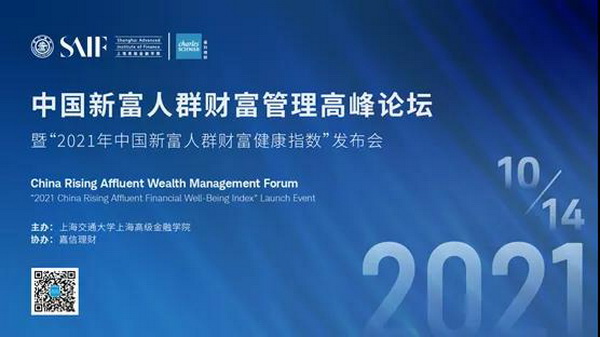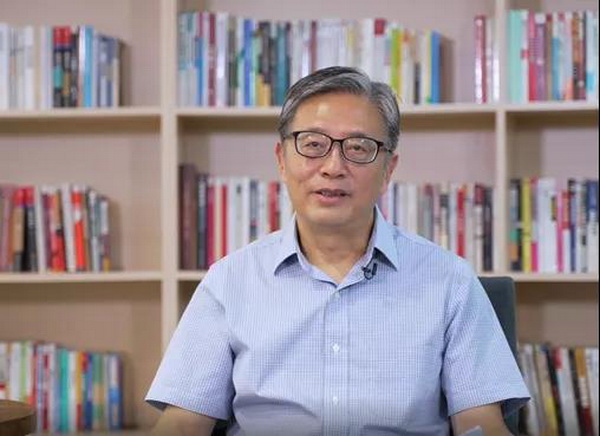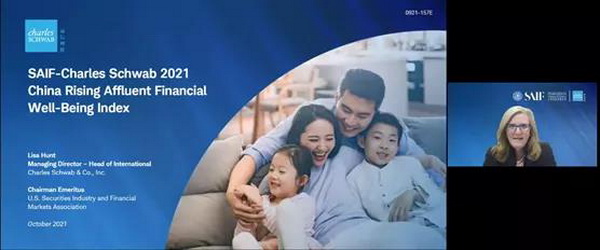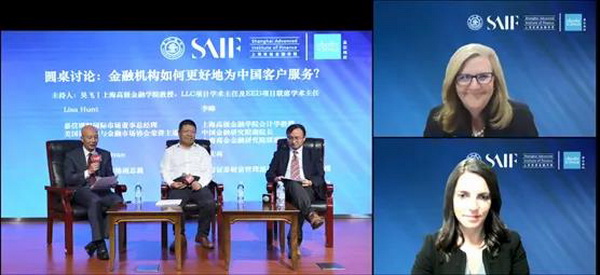On October 14th, 2021, the China Rising Affluent Wealth Management Forum, also known as the press conference for the 2021 China Rising Affluent Financial Well-being Index, was held. It was jointly organized by the Shanghai Advanced Institute of Finance (SAIF) and Charles Schwab (a top US financial services institution). This year's report focused on how affluent Chinese actively adjust their wealth management strategies when facing changing external environments. It also summarizes the changes in financial well-being and investment behavior for this group over the past five years.

Professor Guangshao Tu (Adjunct Professor at SJTU and Executive Director of the SAIF Board), Lisa Hunt (Honorary Chairman of the Securities Industry and Financial Markets Association, Managing Director, Head of International at Charles Schwab), Professor Feng Li (Associate Director of CAFR, Co-Director of SAIFR, Professor of Accounting at SAIF), Professor Fei Wu (Term Professor at SAIF) and other related scholars participated in the press conference. They focused on the extensive changes in the way individual investors manage their wealth due to the COVID-19 pandemic, and had an in-depth discussion on how financial institutions should better serve Chinese investors based on new structural transformation trends for the global financial industry.
At the beginning, Professor Feng Li delivered a welcome speech; he reviewed the cooperation on the China Rising Affluent Financial Well-being Index between SAIF and Charles Schwab over the past five years. He said that Charles Schwab is one of the leaders in the integrated wealth management industry and has rich practical experience in the field of wealth management — which lays a solid foundation for the cooperation between the two sides. He also hoped that continued cooperation would have further impact in the future.
In Professor Guangshao Tu's speech, he shared his understanding and views on the released index and highly praised the significance of the cooperation between SAIF and international institutions. At the same time, he emphasized three points, including: enhancing financing awareness, improving financial planning, and strengthening asset management. He hoped that we can further develop domestic wealth management and asset management institutions, enhance the capabilities and professionalism of practitioners, and develop smart investment advisors.
At the end of the forum, Professor Tu highlighted the fact that education is the foundation of wealth management. He pointed out that both individuals and institutions progress continuously in learning to manage wealth assets. Thus, it is necessary for SAIF to cooperate further with relevant parties, not only in the construction of think tanks and research but also in aspects of cultivating talent.

During the conference, Lisa Hunt (Managing Director, Head of International Charles Schwab) interpreted the report in detail. According to the index, the overall level of China's rising affluent well-being increases reached new heights. In 2021, the Well-Being index was 72.02%, showing a slight increase of 2.29% as compared to 2020. Among the sub-indices, the Confidence and Engagement indices see significant year-on-year rises of 2.97% and 2.6%, reaching 74.18% and 79.23% (respectively) while Planning and Management indexes fall to 43.06% and 45.49%.

Since the COVID-19 pandemic, more of China's rising affluent began to adopt new planning and management measures, including developing an understanding of risk appetite in line with industry standards (30.1%), regularly reviewing financial goals (27.8%), and adopting a professional, reasonable financial plan (24.1%). This, to some extent, raised their expectations about their future financial well-being. More respondents (19.8%) stated that they now have a higher possibility of achieving financial goals, as compared to 8.5% in 2020.
At the same time, their understanding of wealth management has also improved. A significant portion of respondents now demonstrate an ability to accurately assess the components of good wealth management — 41.5% identify financial planning capability as a key element, with 44.1% identifying correct assessment of personal financial goals and 50.9% identifying reasonable asset allocation.
During the discussion session, Professor Fei Wu said, "Facing a complex and changing external environment, the rising affluent have gradually recognized the importance of optimizing their personal and family wealth management strategies. This year's data shows that they are eager to improve their financial literacy, which indicates that the group is willing to adjust their investment method in response to pressure from the external environment and that they are financially prepared to achieve their life goals."

As their demand for authoritative financial advice and knowledge increases, the affluent actively obtain information through financial institutions, financial platforms, and social media. These preferences are underpinned by growing trust in financial advisors and institutions over the last five years. In 2017, 57.8% reported high levels of trust. In 2021, 75.5% do, with just 0.6% reporting low trust. Similar increases have been recorded in respondents' opinions regarding the helpfulness and trustworthiness of financial platforms. More respondents (72.9%) now believe that platforms are very helpful, up from 56.2% in 2017. Levels of trust increased from 55.9% to 71.0% across the same period. In terms of social media, 64.6% prefer to view financial education information, and 77.7% like to consult articles published by authoritative financial institutions.
Many respondents have shown interest in the ability of professional advisors and digital platforms to provide fundamental financial planning and management services. However, this year few respondents are thinking far ahead according to the low planning sub-index, indicating that they have not yet been able to transfer positive financial and investment ideas into practice. The survey also shows that the rising affluent should focus more on long-term investments to better achieve their financial goals.
"Financial planning is the cornerstone of wealth management. We hope that financial institutions can work together to optimize their service models to better serve Chinese investors and help the rising affluent build a better future." Lisa Hunt emphasized in her speech.
The China Rising Affluent Financial Well-being Index
Initiated by SAIF and Charles Schwab, the China Rising Affluent Financial Well-being Index is now being carried out by Nielsen, an international monitoring and data analysis company. This index tracks the shifting perceptions about financial well-being of the people who are driving China's economic future. The 2021 Index helps financial professionals to better understand and explore the investment behaviors of China's rising affluent population in order to provide more services tailored for this group — which is of extreme importance to both Chinese and global economies.
The survey interviewed more than 3,600 rising affluent individuals with annual incomes of RMB 125,000 to RMB 1,000,000 and with investable assets of less than RMB 7,000,000. The 15 cities covered in China included: Shanghai, Beijing, Guangzhou, Shenzhen, Chengdu, Hangzhou, Dalian, Xiamen, Chongqing, Wuhan, Nantong, Shijiazhuang, Zhongshan, Kunming, and Xiangyang. The questionnaire consists of 65 questions involving core issues related to index modeling.






